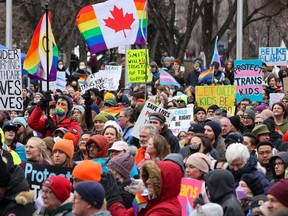The study involved nearly 6,000 participants in Finland, including university faculty, students and the general public
Article content
“Woke” beliefs are associated with increased instances of anxiety and depression according to a new study published in the Scandinavian Journal of Psychology.
Released earlier this month, the study involved nearly 6,000 participants in Finland, including university faculty, students and the general public. The CSJAS was based on theoretical frameworks from intersectional feminism, critical race theory and queer theory.
Advertisement 2
Article content
Article content
Researches developed a seven-item scale, known as the Critical Social Justice Attitudes Scale (CSJAS), to assess attitudes toward “critical social justice,” defined as systemic injustices affecting various identity groups. The CSJAS evaluates agreement or disagreement with seven statements, with each statement targeting a specific aspect of social justice discourse, including systemic racism, microaggressions and gender identity.
The scale reads as follows:
- “If white people have on average a higher level of income than black people, it is because of racism.”
- “University reading lists should include fewer white or European authors.”
- “Microaggressions should be challenged often and actively.”
- “Trans* women who compete with women in sports are not helping women’s rights.”(reverse scored)
- “We don’t need to talk more about the color of people’s skin.”
- “A white person cannot understand how a black person feels equally well as another black person.”
- “A member of a privileged group can adopt features or cultural elements of a less privileged group.” (reverse scored)
Article content
Advertisement 3
Article content
For the statements that are “reverse scored,” agreement indicates a stance opposite to what’s written. Reverse scoring allows all answers to be interpreted in the same direction, even when questions are asked in different ways, some positively and some negatively.
Recommended from Editorial
The findings revealed that women showed significantly more support for critical social justice propositions than men and overall, such support was less common in Finland than public and media discussions would have one believe.
Being on the political left was found to be more predictive of lower mental well-being than high critical social justice scores alone.
“People who supported left-wing parties and female university students in social sciences, education, and humanities, as well as people with ‘other’ gender, were the most in support of the scale items,” wrote the study authors.
The research aimed to fill the gap in empirical data regarding the prevalence and impact of critical social justice attitudes. The CSJAS scale is intended as a tool for future research, including focusing on populations beyond Finland.
Advertisement 4
Article content
Previous studies have found that varying political ideologies are linked with different social attitudes, ways of thinking and even personality traits. A 2003 study in The Psychological Bulletin found that conservatism is linked to greater fear of death, desire for stability, dogmatism and a craving for order, while being less open to new experiences and less tolerant of uncertainty.
Some studies have found that political activism might contribute to psychological well-being by providing a sense of purpose and community, while others have found that high levels of engagement with social justice issues may contribute to stress and burnout.
Our website is the place for the latest breaking news, exclusive scoops, longreads and provocative commentary. Please bookmark nationalpost.com and sign up for our newsletters here.
Article content














